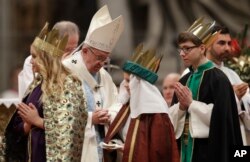China and the Vatican have been holding talks in recent months that could eventually re-establish diplomatic ties after more than 60 years, analysts say, meaning a likely break in the papal state's relationship with Chinese rival Taiwan and a major blow to Taipei's slipping recognition overseas.
Last month the Chinese government’s head of religious affairs told a meeting of the official Catholic Church in the vast Communist country that he hoped the Vatican would try to improve relations by adapting to his society. China and the Vatican dispute who should have power to appoint bishops, each seeking to exert more influence than the other.
The Vatican's recognition of Taiwan has helped the Asian government show other countries that it values religious freedom, different from the reputation of China, and that it has a powerful friend in Europe that China can’t get, analysts say. Taiwan’s other 20 diplomatic allies are small, mostly poor countries in Africa, Latin America and the South Pacific. They look to Taiwan for development aid.
China sees self-ruled Taiwan as part of its territory rather than a state with the right to foreign relations.
“To be a small country, we still have to build up some formal diplomatic relations with some countries, and that is proof that Taiwan is a sovereign state, so I would say the Vatican is a small country but it has a very profound political, symbolic meaning to Taiwan,” Wu Chung-li, a political science research fellow at Academia Sinica, a university in Taipei.
China severed relations with the Vatican 1951 two years after the Communists had won a Chinese civil war that also sent the Nationalists to Taiwan where they re-established their government.
Since then, China has closed churches and imprisoned priests, according to news reports from Beijing. Catholics may legally practice religion in state-sanctioned churches not overseen by the Vatican. About one-third of an estimated 12 million Catholics in China worship at underground churches.
Pope Francis is described in Taiwan as being particularly keen to form relations with China, which Catholic News Agency described in October as a “major effort of this papacy” though also challenged by the question of recognizing Taiwan.
China-Vatican discussions last year focused largely on who could appoint bishops, Taiwan Vice President Chen Chien-jen told a news conference in Taipei Saturday. He called ties with Taiwan “normal” and said it made sense for Chinese Catholics to seek bonds with the Vatican.
“I think relations with Taiwan are continuing to develop in a stable way,” Chen said. “As for the Vatican-China talks, we think for mainland Chinese Catholics is quite important because every Catholic will want to have the Vatican’s blessings.”
A possible Sino-Vatican agreement last month was set back when a bishop who was supported by the Beijing government -- and who had been excommunicated by the Vatican -- participated in the ordination of new bishops. China and the Holy See had communicated earlier last year on the same topic.
Taiwan’s relations with the Vatican have given the island valuable international exposure when its president attends the funerals of popes, said Fabrizio Bozzato, an associate researcher specialized in international affairs at Tamkang University in Taiwan. The Vatican’s recognition of Taiwan also “bestows a moral imprimatur” on the island, he said.
An alliance with the Vatican also may help Taiwan keep the recognition of six predominantly Catholic Latin American countries, Wu said. Those governments might otherwise feel free to recognize China instead, he said. China does not allow its 170-plus foreign allies to recognize Taiwan.
Last month Taiwan lost an ally in Africa, the island nation of São Tomé and Principe, to China.
China would not normally be hurrying to form ties with the Vatican, a 44-hectare (110-acres) district inside Rome, but because of poor relations with President Tsai Ing-wen in Taipei it might speed things up, Bozzato said.
Tsai has upset Beijing since she took office in May by declining to see Taiwan as part of “one China,” a prerequisite for any dialogue. Beijing particularly expressed anger when Tsai called U.S. President-elect Donald Trump Dec. 2, raising the possibility of a closer Taiwan-U.S. relationship during Trump’s term.
A Vatican switch to China would point to a failure by Tsai to keep a particularly prized diplomatic relationship, said Alex Chiang, international relations professor with National Chengchi University in Taipei. It would send a signal to some, he said, that Tsai should find a way to open negotiations with China.
“It hurts because we’ve tried to keep the ties with the Vatican for many, many years,” Chiang said, describing a scenario where the Vatican has broken off relations. But, he cautioned, “the pope is very interested in establishing a relationship with China just for the reason that there are a lot of Catholics in mainland China.”









